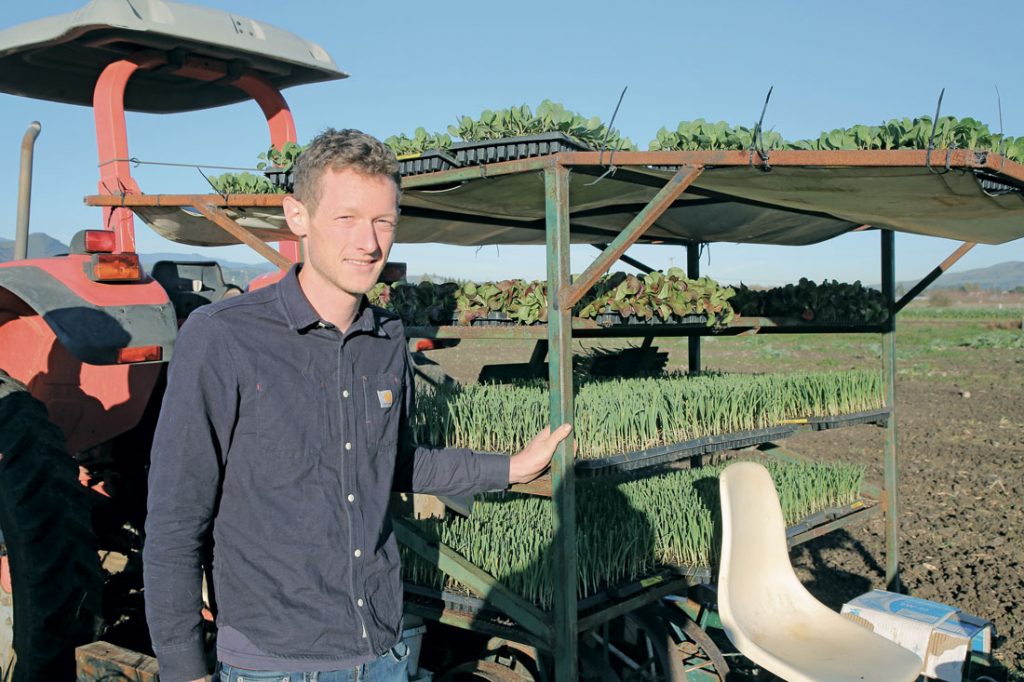
Although the challenges continue to close in, small farms are still thriving in Santa Clara County as demand for local, organic produce remains steady throughout the region.
That was a key conclusion of a report released last week by the Santa Clara County Food System Alliance, a collaboration of the county’s agricultural commissioner and several local nonprofits. The lengthy report highlights the viability of small-scale agriculture in Santa Clara County, where 52 percent of farmland parcels are 10 acres or less.
The report showcases a handful of small farms in the region, including Spade & Plow, which is based in San Martin. Owned by the Thorp family, Spade & Plow leases two farm parcels in separate locations in South County, totaling just over 25 acres.
The Thorps grow a wide variety of produce year-round. This winter, they’re growing cauliflower, artichokes, cabbage, fennel, garlic, lettuce, beets, carrots and more, Sam Thorp said the morning of Feb. 3 at Spade & Plow’s parcel on Foothill Avenue. Sam and his brother, Nick Thorp, and father, Mike Thorp, were transplanting young leeks into the ground when they took a quick break to talk about the local farming scene.
Most of Spade & Plow’s customers are recipients of the farm’s Community Supported Agriculture program, which provides households with a weekly or bi-weekly box of the farm’s freshest fruits and vegetables. This program “gives people more opportunities to support local and eat organic,” Sam Thorp said.
Spade & Plow also sells its produce to local restaurants and distributors, and hosts a booth every Saturday at the Morgan Hill Farmers Market, Thorp said.
The Thorp family grew up farming in Monterey County, and has been growing crops in Santa Clara County since about 2015. The family wanted to farm here specifically because they saw an “underserved need” for organic and local produce. There is more demand in the region for local organic produce than a small farm like Spade & Plow can meet.
The Thorps said one of the biggest challenges in Santa Clara County—echoed in the county’s report—is the availability of land for farming. Spade & Plow recently lost some acreage it was leasing on Foothill Avenue when the property owner decided to use the land for another purpose.
“It’s getting harder for smaller and bigger farms to find more available land,” Nick Thorp said.
But the Thorps are repeatedly encouraged by the support for local agriculture among their customers, local officials and farming advocates.
“The community has really stood behind us as we’ve gotten the word out,” Sam Thorp said. “Our members and customers see the value in Santa Clara County agriculture.”
Despite the limited supply of farmland, Spade & Plow grew about 20 percent more crops in 2019 than the previous year, and its sales have gone up. The Thorps attribute this growth not only to the community support: It’s also a factor of their need to “grow smarter” as the challenges remain in place.
Everyone benefits from small farms
The Food System Alliance report released last week “dispels the myth that small farms cannot be viable in the county,” reads a statement from the county. The report builds on the recommendations of the Santa Clara Valley Agricultural Plan, which the county’s board of supervisors approved two years ago.
Despite the success of small farms showcased in the report, additional efforts needed to protect them as the valley becomes more populated include facilitating access to and permanently preserving farmland; making farmland affordable to small farmers; investing in land conservation and climate smart practices; increasing sales and consumption of locally produced food; and streamlining regulations that slow down small farms.
The report identifies a variety of ways the public benefits from small farms, including their support of a resilient urban food supply, as well as their abilities to drive a local food economy and mitigate climate change impacts. But in the last 30 years, more than 15,000 acres of farmland in Santa Clara County has been lost to development.
“Agriculture plays a vital role in climate change mitigation and farmland generates 70 times less greenhouse gas emissions than developed land,” said Julie Hutcheson, Director of Impact for Green Foothills. “In addition to carbon sequestration, the ecological benefits of preserving farmland include flood control, groundwater recharge, fire hazard mitigation and pollinator habitat.”
Other local small farms highlighted in the Santa Clara County Food System Alliance report include olive oil producer Frantoio Grove in San Martin, and Asian vegetable grower Shun-Fat Nursery in Morgan Hill.








